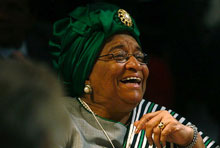The IMF and Civil Society

Liberian President Ellen Johnson-Sirleaf. "Encouraging track record of macroeconomic management," says IMF.
Delivering Debt Relief to Liberia
November 21, 2007
The IMF announced on November 12 that it has secured sufficient financing pledges from member countries to allow the IMF to provide debt relief to Liberia.
Hailing a "breakthrough" in financing, IMF Managing Director Dominique Strauss-Kahn, said this represented "a critical step in moving Liberia onto a path toward comprehensive debt relief." Now that the debt relief effort is being formalized, "IMF staff are [...] finalizing discussions with the Liberian authorities on a three-year, IMF-supported program, so that Liberia can build upon the initial economic recovery, maintain the strong growth needed to reduce poverty, and restore debt sustainability," Strauss-Kahn said in his November 12 statement.
Once the pledges, totaling around $842 million, are formalized, Liberia and the IMF will initiate a process of arrears clearance and new Fund financing that will enable the delivery of IMF debt relief to Liberia. Strauss-Kahn thanked IMF member countries for their "generous support," citing "efforts of many leaders around the world" including low-income countries, in securing the financing. He also acknowledged roles played by Liberian President Ellen Johnson-Sirleaf and her economic team, and World Bank President Robert Zoellick.
In a letter to civil society organizations (CSOs), External Relations Director Masood Ahmed also thanked CSOs for the role they played in the push for Liberias debt relief. The IMF received a large volume of emails expressing concerns about Liberia's debt situation. This strong public support to the cause of debt relief contributed to the broad donor support that made the financing possible.
Since the announcement and the letter to CSOs, the reactions from CSOs have been very positive. Jubilee USA Network called the announcement "great news, and a real breakthrough" in an email to its supporters. Steven Radelet of the Center for Global Development acknowledged in a blog entry that "IMF staff worked hard throughout the process" but added that "the public push gave the impetus to member countries, the Board, and senior management to get the deal done.
"There is still a long way to go, but this is a big step forward in the process," he said.
The debt relief agreement follows talks between the IMF and the Liberian government during the IMF/World Bank Annual Meetings in October. Former IMF Managing Director Rodrigo de Rato said in an October 18 statement that it was "urgent that the international community make progress in moving Liberia onto the path toward debt relief." De Rato said the effort hinged on securing the resources needed to provide debt relief to the country. He also sent a letter to the musician and activist Bono who had publicly advocated for Liberias debt relief.
Johnson-Sirleaf took office in January 2006, leading a country that was emerging from a 14-year civil war that ended three years earlier. Despite these difficult post-conflict circumstances, the Liberian government has established an encouraging track record of macroeconomic management and reforms that the IMF has supported through technical assistance and policy advice. But for the government to sustain its efforts, it needed to normalize its relationship with the international community. For this to happen, Liberia had to clear its arrears and resources had to be found for debt relief. This involved a series of challenging steps:
- A key stumbling block to rapid action was that the IMF lacks funds to provide debt relief to countries in protracted arrears to the Fund because they were excluded from previous fund-raising exercises. IMF staff had to come up with a debt relief package that involved a complex arrangement of two sources of existing funds, which then formed the basis for mobilizing bilateral contributions. The advantage of the approach was that no new money had to be raised and the members were given a menu of options for contributions.
- Once the Funds Executive Board had approved the method, member countries needed to agree to contribute their share. However, there was little precedent for rapid actionthe previous HIPC fund-raising exercise took almost five years. The IMF team designed a game plan, with a series of strategic sequential steps.
- The strategy included a letter-writing campaign customized for each member country that had not yet come forward with their pledges, thousands of phone calls and e-mails, and innumerable formal and informal briefs and conversations with key decision makers.
- One by one, countries signed on. It was a cause for celebration each time that we received a positive response from a country, no matter how small the amount, one staff member working on the deal said.
